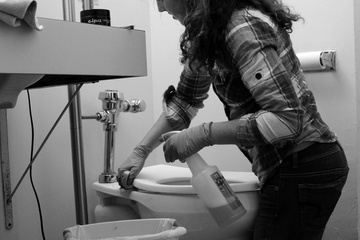“My time and dignity are worth more than cleaning bathrooms for $17.50 an hour.”
From across our two dining hall trays at lunch, he had asked me about Dorm Crew, and, as a captain of the program, I had been excited to explain: Dorm Crew provides wages to students working as custodial staff in the Houses, a job that ranges in responsibility from shoveling snow to coordinating move-out to cleaning bathrooms.
We mostly clean bathrooms.
My Dorm Crew career began during Fall Clean-Up, the pre-orientation program that pays soon-to-be-freshmen to bond over damp-dusting lamps and mopping floors. The first day, I was crammed into the bedroom of a first floor suite in Pennypacker with 10 other over-eager freshmen, most of us still rubbing our sleep-crusted eyes. The head of our group was demonstrating how to operate the clumsy purple backpack vacuums that would later become weapons in our battle against cockroach carcasses. I tried to keep track of all the different steps. But between my anxiety about my first day at Harvard, and that stifling heat that accrues when too many bodies squeeze into too small a space, I fainted.
The job isn’t nearly glamorous nor thrilling enough for the likes of my lunch partner. After all, explaining your janitorial job to a McKinsey recruiter does seem more difficult than explaining your involvement in one of the numerous finance or consulting-oriented clubs on campus. Wiping down sinks doesn’t fit neatly under the “Technical Skills” category on a resume. His concern is a valid one.
He urged me to consider the “auxiliary benefits” of so many other campus jobs that I was missing out on by spending my time scrubbing porcelain thrones, pointing to library jobs with minimal time commitment or research assistantships that would facilitate “connections.” Connections were on his mind often, it seemed.
But for many, “auxiliary benefits” are just that—auxiliary. My primary motivation in seeking employment is the guaranteed flow of steady income and the luxuries it allows me to afford: buying books for the semester, flying home for the holidays, or god forbid, the occasional Starbucks run with a friend. There is no room for considerations of minimum required work hours or potential access to faculty mentors. For me and many others, a job means money.
In my home state of Arkansas, where the minimum wage clocks in at a whopping $8.50 per hour, many people would jump at the opportunity to wipe down mirrors for $17.50, but here, students scoff at it. For those students, campus employment is about wants rather than needs, and the latter just doesn’t compute.
When I decided to continue working for Dorm Crew after Fall Clean-Up, I anticipated more long hours wielding grout brushes with rubber gloved-hands. What surprised me was the community I found there, the students whom I got to know while standing in a shower, scrubbing soap scum off the tile walls. All of us work for Dorm Crew for different reasons, but none of us mind sticking our faces closer to a toilet bowl than should ever be allowed for a sober person. One year removed from that day in Pennypacker, I’m proud to be a Dorm Crew captain. Auxiliary benefits, indeed.
If cleaning bathrooms seems like such a laborious and unsophisticated task, then I urge you: The next time a Dorm Crew member comes to clean your bathroom, tell them to skip it. You will save us the work and can keep your head held high, time and dignity preserved.





